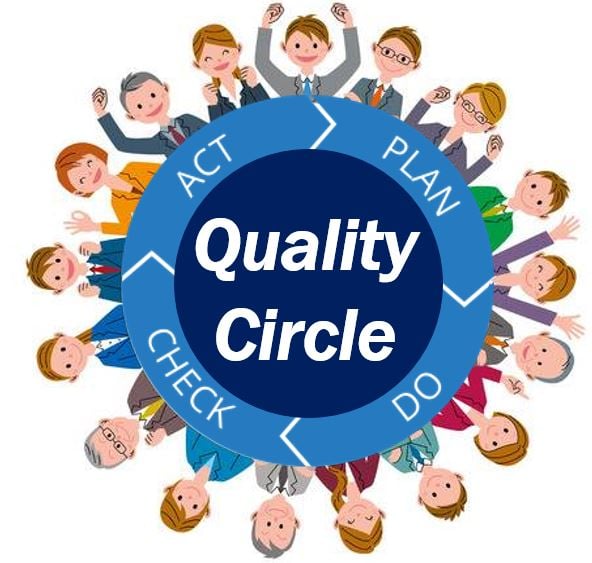Introduction
In the fast-paced and competitive landscape of today’s industry, organizations strive to achieve excellence in product quality, customer satisfaction, and operational efficiency. One powerful tool that has gained significant recognition in this pursuit is the concept of quality circles. With their ability to tap into the collective wisdom of employees, quality circles have emerged as a key strategy for fostering a culture of continuous improvement. In this article, we will delve into the concept of quality circles, their benefits, implementation strategies, and how they can drive organizational success in the industry.
- Understanding Quality Circles: A Collaborative Approach (200 words): Quality circles are voluntary groups of employees who come together to identify, analyze, and solve problems related to quality improvement within an organization. Originating in Japan, quality circles gained prominence as a crucial component of total quality management (TQM). These circles typically consist of employees from various departments or areas of expertise, ensuring diverse perspectives and a comprehensive approach to problem-solving. By harnessing the collective knowledge and skills of employees, quality circles create an environment conducive to innovation and continuous improvement.
- Benefits of Quality Circles : Implementing quality circles can yield numerous benefits for organizations in the industry. Firstly, quality circles promote employee engagement and empower individuals by involving them in decision-making processes. This fosters a sense of ownership and pride, leading to increased job satisfaction and higher morale. Secondly, quality circles enable organizations to tap into the wealth of knowledge and experience possessed by their employees. By encouraging open communication and collaboration, quality circles enhance problem-solving capabilities, leading to more effective and sustainable solutions. Lastly, quality circles drive a culture of continuous improvement, enabling organizations to adapt to changing market dynamics, enhance productivity, and deliver higher-quality products and services.
- Implementing Quality Circles: Best Practices: To implement quality circles successfully, organizations need to follow certain best practices. Firstly, top-level management support and commitment are crucial to create a culture that values quality circles and their contributions. This involves allocating resources, setting clear goals, and integrating quality circle activities into the overall organizational strategy. Secondly, it is essential to provide training and support to quality circle members, ensuring they possess the necessary skills in problem-solving, data analysis, and communication. Regular coaching and mentoring sessions can further enhance their effectiveness. Thirdly, establishing a structured problem-solving process, such as Plan-Do-Check-Act (PDCA) or Six Sigma, can guide quality circle activities and ensure systematic improvement efforts. Additionally, organizations should create a conducive environment that encourages open communication, trust, and respect among quality circle members. This can be achieved through regular meetings, feedback mechanisms, and recognition of achievements.
- Overcoming Challenges in Quality Circles : While quality circles offer immense potential, certain challenges may arise during their implementation. One common challenge is sustaining member participation and enthusiasm over time. Organizations can address this by providing continuous support, recognizing and rewarding achievements, and showcasing the impact of quality circles on organizational success. Another challenge lies in managing resistance to change. By fostering a culture of openness, addressing concerns, and communicating the benefits of quality circles, organizations can alleviate resistance and gain buy-in from all levels of the workforce. It is also important to ensure that quality circles are not seen as an alternative to management responsibility but as a collaborative effort that complements existing organizational processes.
Quality circles provide organizations in the industry with a powerful tool for improving quality, enhancing productivity, and driving continuous improvement. By harnessing the collective wisdom of employees, quality circles foster employee engagement, innovation, and ownership. Through effective implementation strategies, organizations can create an environment where quality circles thrive, resulting in increased job satisfaction,higher morale, and improved business outcomes. Embracing quality circles as a core element of the organizational culture can empower employees, unlock their potential, and position the organization for success in today’s competitive industry landscape.
Quality Hub India: Empowering Excellence through Training and Certification Programs with Quality Circle Concepts
Introduction : In the quest for organizational excellence, businesses in India are increasingly turning to training and certification programs to enhance their workforce’s skills and capabilities. Quality Hub India has emerged as a leading provider of such programs, offering a range of courses designed to drive quality improvement and foster a culture of continuous learning. This article explores the training and certification programs offered by Quality Hub India, with a specific focus on their incorporation of the quality circle concept. We will delve into the benefits, features, and impact of these programs on organizations striving for quality excellence in India.
- Quality Hub India: A Gateway to Quality Improvement : Quality Hub India has established itself as a premier institution in India, dedicated to equipping professionals with the knowledge and skills necessary to drive quality improvement. With a comprehensive portfolio of training and certification programs, Quality Hub India caters to diverse industries and sectors, including manufacturing, services, healthcare, and more. Their programs encompass a wide range of quality management principles, methodologies, and tools, empowering individuals and organizations to excel in their respective fields.
- Embracing the Quality Circle Concept : Quality Hub India recognizes the value and potential of quality circles as a catalyst for continuous improvement and employee engagement. They offer specialized courses that focus on the quality circle concept, enabling organizations to harness the collective wisdom and problem-solving abilities of their workforce. These courses cover various aspects of quality circles, including formation, facilitation, problem-solving techniques, and effective implementation strategies. By incorporating the quality circle concept into their training and certification programs, Quality Hub India empowers professionals with the knowledge and skills necessary to establish and sustain successful quality circles within their organizations.
- Benefits and Impact of Quality Circle Courses : The quality circle courses offered by Quality Hub India deliver numerous benefits to organizations and individuals. Firstly, these courses foster a participatory culture by encouraging active employee involvement in problem-solving and decision-making processes. This leads to increased employee engagement, job satisfaction, and a sense of ownership. Secondly, the courses equip individuals with essential skills such as effective communication, data analysis, root cause analysis, and collaborative problem-solving techniques. This enhances their problem-solving capabilities and equips them to drive meaningful improvements in their organizations. Thirdly, quality circle courses create a platform for knowledge sharing, collaboration, and cross-functional learning, breaking down silos and promoting a holistic approach to quality improvement.
- Customized Programs and Continuous Support : Quality Hub India understands that each organization has unique requirements and challenges. To address this, they offer customized training and certification programs tailored to the specific needs of businesses. These programs are designed to align with the organization’s goals, industry standards, and regulatory requirements. Furthermore, Quality Hub India provides continuous support to organizations even after the completion of the courses. They offer consultancy services, guidance on implementation, and facilitate networking opportunities for professionals to exchange experiences and best practices.
You can join Quality HUB India Quality Circle course from the below given link:
Problem Solving through ‘Quality Circle Concept’ (QCC)
Conclusion : Quality Hub India’s training and certification programs, with their focus on the quality circle concept, play a vital role in empowering organizations and professionals to drive quality improvement and excellence. By incorporating the principles of quality circles, these programs foster employee engagement, promote collaboration, and equip individuals with the necessary skills to tackle complex quality challenges. With their customized approach and continuous support, Quality Hub India serves as a valuable partner for organizations across industries in their pursuit of quality excellence in India.
Quality HUB India Offered “Lean Management” Online Courses:
Hindi Version:
- Basics of Lean Management and TPS
- Lean Expert Silver (Level 2)
- Lean Expert Gold (Level 3)
- 5S Expert
- KAIZEN Expert
- Advanced Value Steam Mapping (A-VSM)
English Version:
- Basics of Lean Management and TPS (Under Development)
- Lean Expert Silver (Level 2) (Under Development)
- Lean Expert Gold (Level 3) (Under Development)
- 5S Expert (Under Development)
- KAIZEN Expert (Under Development)
- Advanced Value Steam Mapping (A-VSM) (Under Development)
Related Articles:
What is TPM? How to Implement TPM? Benefits of implementing TPM. Best TPM Books
List of Popular Online Six Sigma Courses from Beginner to Advanced








